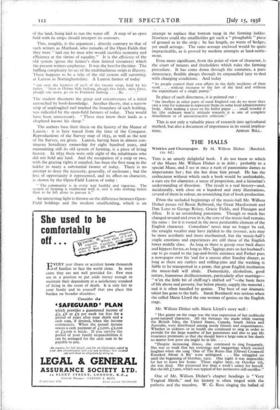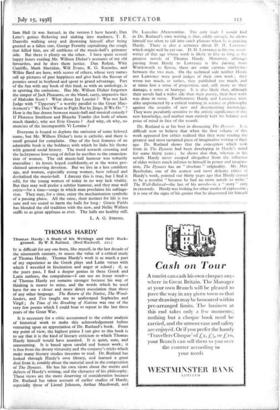THE HALLS
Tins is an utterly delightful book. I do not know to which of the Muses Mr. Willson Disher is in debt ; probably to a special Muse, and I see at once a rush of pantomime dames to impersonate her ; but she has done him proud. He has the enthusiasm without which such a book would be unthinkable, a sure eye for character, a sense of proportion, .and a historian's understanding of direction. The result is a real history—and, incidentally, with close on a hundred and sixty illustrations, several of them in colour, an astonishing feat of book production.
Ffom the secluded beginnings of the music-hall Mr. Willson Disher passes vid Bessie Bellwood, the Great Macdermott and Dan Leno to George Robey, Gracie Fields, and Flanagan and Allen. It is an astonishing panorama. Though so much has
changed around and even in it, the core of the music-hall remains the same : for it is rooted in the most perdurable element of the English character. Comedians' noses may no longer be red, the straight vocalist may have yielded to the crooner, acts may
be more acrobatic and more mechanised, but the music-hall's staple emotions and experiences are still those of the English lower middle class. As long as there is gossip over back doors and kippers for tea, as long as Mrs.'Iggings puts on her husband's cap to go round to the jug-and-bottle entrance and Father puts a newspaper over his 'ead for a snooze after Sunday dinner, as long as there are curlers and rolling-pins and the washing is liable to be transported in a pram, that great English institution the music-hall will abide. Domesticity, alcoholism, good nature, humorous disillusionment, particularly after marriage-
" w'en the little bit of chiffong's shifted orf "—the basic facts of life above real poverty,-but below plenty, supply, the material ; and it is often handled by genius. The best of our dramatic talent has gone to the halls. Sarah Bernhardt was serious when
she called Marie Lloyd the one woman of genius on the English stage.
Mr. Willson Disher tells Marie Lloyd's story well :
" Her gaiety on the stage was the true expression of her recklessly good-natured character. All the fortunes she made while touring the British Isles, the United States, Canada, South Africa and Australia, were distributed among needy friends and acquaintances. Whether in sickness or in health she continued to sing in order to provide for the large number of her pensioners and also to pay life insurance premiums so that she should leave a large sum at her death no matter how poor she might be in life. . . .
"Despite increasing illness, she continued to sing frequently. She was so weak that her totterings and staggerings which excited laughter when she sang 'One of The Ruins that [Oliver] Cromwell Knocked About A Bit' were unfeigned.. . . She struggled on until the beginning of October, 1922. One night it was impossible for her to leave her home. Three nights later, on October 7th, she was dead. She possessed less than a week's salary for herself. But she left L7,00o, which was typical of her instinctive self-sacrifice."
One of Mr, Willson Disher's chapter headings is " Very Tragical Mirth,'' and his history is often tinged with the pathetic and the macabre. W. G.- Ross singing the ballad of Sam Hall (it was Samuel, in the version I have heard), Dan Leno's genius flickering and sinking into madness, T. E. Dunville walking away and drowning himself after being greeted as a fallen star, George Formby capitalising the cough, that killed him, are all emblems of the music-hall's grimmer side. But there is plenty on the other. I have spent several happy hours reading Mr. Willson Disher's accounts of my old favourites, and he does them justice. Dan Rolyat, Whit Cunliffe, Mark Sheridan, Will Evans, R. G. Knowles, and Wilkie Bard are here, with scores of others, whose very names call up pictures of past happiness and give back the flavour of pennies saved in boyhood and spent to grand advantage. Part of the fun with any book of this kind, as with an anthology, is in spotting the omissions. Has Mr. Willson Disher forgotten the simper of Jack Pleasants, or the bland, suety, impassive face of Malcolm Scott ? What about Jay Laurier ? Was not Jack Judge with " Tipperary " a worthy parallel to the Great Mac- dermott's " We Don't Want to Fight But by Jingo, If We Do " ? How is the line drawn between music-hall and musical comedy? If Florence Smithson and Blanche Tomlin (for both of whom much thanks), why not Evie Greene ? And why, oh why, no mention of the incomparable Vi Loraine ?
Everyone is bound to deplore the omission of some beloved 'name, but Mr. Willson Disher's taste is catholic, and there is Small ground for complaint. One of the best features of an admirable book is the boldness with which he links his theme with general social history. The trend towards crooning and the lachrymose love-song of defeat he ascribes to the emancipa- tion of women. The old music-hall humour was 'robustly masculine : its lovers hoped confidently, or at the worst pro- claimed unswerving devotion. But we live in a less confident age, and women, especially young women, have refined and devitalised the music-hall. I daresay this is true, but I find it odd, for the young women of today in no way lack vitality. But they may well prefer a subtler humour, and they may well enjoy—for a time—songs in which man proclaims his subjuga- tion. They may, for a time, enjoy the mechanisation symbolic of a passing phase. All the same, their instinct for life is too sane and too sound to harm the halls for long : Gracie Fields has blended the old tradition with the new, and Nellie Wallace sniffs to as great applause as ever. The halls are healthy still.
L. A. G. STRONG.











































 Previous page
Previous page